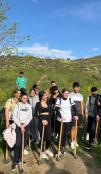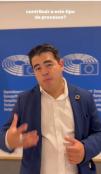We (still) need to talk about Yemen

We need to talk about Yemen because this conflict can’t continue to be a “forgotten” one but also because Yemenis can’t only be seen as victims of a war which was forced upon them. Yemenis are resilient, they are showing it every day.
Mubarak is one of thousands of teachers in Yemen who continue to work despite not receiving a salary. “I volunteer to teach because it is my passion”, he says.
Yemeni girls and boys have the right to an education for a better future. Children can't wait for conflicts to end. The EU is working to ensure access to education to Yemeni pupils, some of whom have been out of school for over 2 years. Through EU support, the number of students attending school has increased by a third in target areas.
The war in Yemen has been raging for around six years. Malnutrition and diseases have ravaged the country, ending thousands of lives. Yemen is the world’s worst man-made humanitarian and development crisis and over 24 million Yemenis are in need of assistance – an astounding 85% of the population. Add to that the Coronavirus pandemic.
And yet “I will keep assisting my community, even without pay. This is my passion. I will not stop practicing my profession despite my difficult situation and despite the lack of income”, says Jamala, one of the millions of Yemenis who have had to flee their homes because of the conflict. She continues to help others in need despite her own precarious situation.
End of 2020, the EU launched an awareness raising campaign. “The idea behind the communication campaign We need to talk about Yemen is simple: in the past five years, Yemen and Yemenis have seldom received the international attention they deserve. They have rarely had the chance of telling their own stories, of talking about their personal struggles, resilience or talents. For far too long, Yemen has been a crisis we didn't hear much about, a forgotten conflict. By launching this campaign, we want to try to address this imbalance. We want to talk about Yemen, and more importantly – listen to what Yemenis have to tell us,” said EU High Representative Vice-President Josep Borrell.
The campaign comes with a virtual exhibition – Phantoms, Ruins and Reflections – which was launched with a virtual event bringing together Hans Grundberg, Ambassador of the European Union to Yemen, Sama’a Al Hamdani, Founder and Director of The Yemen Cultural Institute for Heritage & the Arts, also curator of the exhibition and Alia Ali, Yemeni-Bosnian-American artist whose work also features in the exhibition. Khadija al-Salami, award winning Yemeni filmmaker moderated the discussion. A message by the then EEAS Secretary-General Helga Schmid opened the event. Watch the launch event here: https://www.youtube.com/watch?v=QIvvkmHmb0k&t=899s
Five Yemeni artists feature in this exhibition: Hakim Alakel, Alia Ali, Obeid Salem, Ziryab Al-Ghabri, and Sarah Al-Aulaqi. Each bring their own talents to show us perhaps a different side of Yemen.
During the online launch event, then EEAS Secretary-General Helga Schmid reiterated the European Union’s support to Yemenis: “We have not only been helping Yemenis with their immediate needs and daily life challenges, but we support them also to build up their future.”
The EU Ambassador to Yemen Hans Grundberg shared memories of his personal experiences while visiting Yemen: “During my visits, I have witnessed a strong and resilient country that is ready to turn over this tragic page of its history once and for all.”
And indeed, we need to make this war history. The focus on the future of Yemen is a persistent theme.
At the end of the day, Yemenis may have passions and resilience but they all have similar wishes. “My only wish is to go home”, says Mubarak. “I want to see peace, security and stability return to the country as it was before.”
“No matter what, one must look to the future to live,” are Jamala’s few words of hope.
And talking about the future of Yemen, it belongs to the whole population. The women of Yemen are a largely untapped resource. They can play a vital role in shaping Yemen’s future. Yemen is the worst country in the world to be a woman. It ranks at the bottom of the UN gender equality index and there are very limited work opportunities for women, especially in rural areas.
The EU supports Yemeni women empowerment. A community near Abs, a rural district in the north of Yemen, is benefitting from an EU-funded project employing women to work on solar panels, providing the community with cheaper, clean and renewable energy, while training women and giving them a stable income.
“At first, they made fun of us – that we want to do men’s work. But now, our community is respecting us, as we are business owners" said Iman Ghaleb Al-Hamli, the Director of a solar power station in Yemen managed only by women.
“The role of women was housework only,” laments Huda Othman Hassan, a young woman from Abs. “Although we are educated and university graduates, we had no decision-making power and couldn’t work in any field.”
For the group managing this project in Abs, the work has been transformative.The EU will continue to support Yemeni women too.
Throughout the war, the European Union has worked with the United Nations to help reach a political solution to the conflict, lending its full support to the efforts of the UN Special Envoy. Since the beginning of the conflict in 2015, the EU has provided close to €1 billion in much-needed aid for Yemenis but also in support of agriculture, schools, hospitals, small and medium companies.
Yemenis deserve everyone’s attention. They deserve an inclusive peace agreement. They deserve a better future. They cannot and should not wait any longer. We must end their suffering.
For more information on what the EU is doing to help Yemenis: https://twitter.com/eu_eeas/status/1327899138910953472





